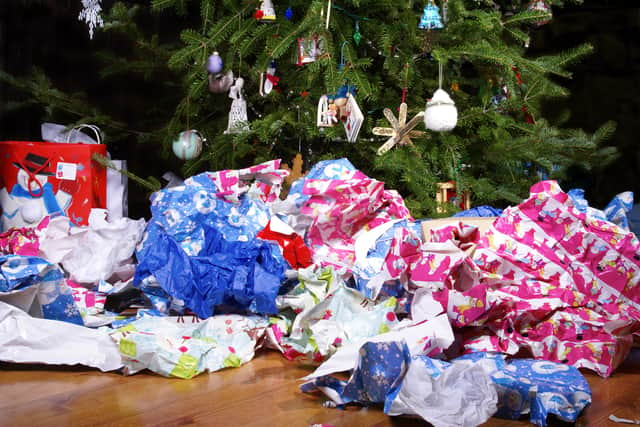Can you recycle wrapping paper and Christmas cards? Guide to what you can put in the recycling bin after Xmas
This article contains affiliate links. We may earn a small commission on items purchased through this article, but that does not affect our editorial judgement.
and live on Freeview channel 276
While the Christmas season brings lots to be excited about, like turkey dinners and presents, it’s also the time of year where the most waste gets generated thanks to things like wrapping paper and Christmas cards.
With so much more attention being paid to the environment following the COP26 summit in Glasgow earlier this year, this is what you need to know about recycling your Christmas leftovers.
Advertisement
Hide AdAdvertisement
Hide AdCan you recycle wrapping paper?
If you’re not sure if your wrapping paper is recyclable or not, you can try something called the scrunch test - if you scrunch up your wrapping paper and it stays scrunch then it means that you can go ahead and recycle it.
Before recycling, make sure and remove anything from the wrapping paper that might make it unsuitable for recycling, like sticky tape and ribbons.
You can also recycle the cardboard tubes that are usually found in rolls of wrapping paper.
What makes some wrapping paper non-recyclable?
There are a number of reasons why some wrapping paper cannot be recycled.
Advertisement
Hide AdAdvertisement
Hide AdWrapping paper is quite often dyed, laminated and/or contains non-paper additives like glitter, ribbons, plastics etc which cannot be recycled.


Recycle Now also says that “some wrapping paper is very thin and contains few good quality fibres for recycling”.
A lot of wrapping paper is covered with sticky tape as well, which also makes it unsuitable for recycling.
Are Christmas cards recyclable?
Most cards are paper based and that means that they can be recycled, alongside their envelopes as well.
Advertisement
Hide AdAdvertisement
Hide AdSimilarly to wrapping paper, make sure and remove any additions like ribbons or glitter as these items cannot be recycled.


If any musical cards have made their way into your home, it’s important that you remove the batteries before recycling.
You can recycle your batteries as well - check out the Recycle Now website to find out what you can recycle at home, and where you can find your nearest recycling centre.
How can I be more environmentally friendly at Christmas?
If you’re looking to celebrate Christmas in a more eco-friendly way, there are a few different things you can do.
Advertisement
Hide AdAdvertisement
Hide AdTry buying wrapping paper that’s already been made from recycled materials, and reuse things like gift bags and gift boxes instead of wrapping paper.
Always save your Christmas decorations to use again and again each year. Nowadays you can find things like reusable DIY Christmas crackers which are much more environmentally friendly than their single use counterparts.
Also think about using LED lights for your Christmas tree, as they use less energy but shine just as bright - and remember to turn your lights off at night.
When it comes to the gifts themselves, WWF suggests giving an experience rather than an object.
Advertisement
Hide AdAdvertisement
Hide AdIt says: “Reduce demand for physical resources by gifting an experience to your loved ones instead.
“Whether it’s gifting your time or a pre-bought experience, it’s a great opportunity to bring people together.”
You can cut your food waste at Christmas as well by planning ahead with how much food you need - and actually being realistic. You should also make sure to save any leftovers in the fridge or freezer instead of binning items that are still good to eat.
WWF also says that “eating more plant-based meals is good for you and the planet”.
Advertisement
Hide AdAdvertisement
Hide AdIt explains: “The livestock industry alone generates nearly 15% of all man-made greenhouse gas emissions and requires space and huge amounts of water and feed.”
A message from the editor: Thank you for reading. NationalWorld is a new national news brand, produced by a team of journalists, editors, video producers and designers who live and work across the UK. Find out more about who’s who in the team, and our editorial values. We want to start a community among our readers, so please follow us on Facebook, Twitter and Instagram, and keep the conversation going. You can also sign up to our newsletters and get a curated selection of our best reads to your inbox every day.
Comment Guidelines
National World encourages reader discussion on our stories. User feedback, insights and back-and-forth exchanges add a rich layer of context to reporting. Please review our Community Guidelines before commenting.
